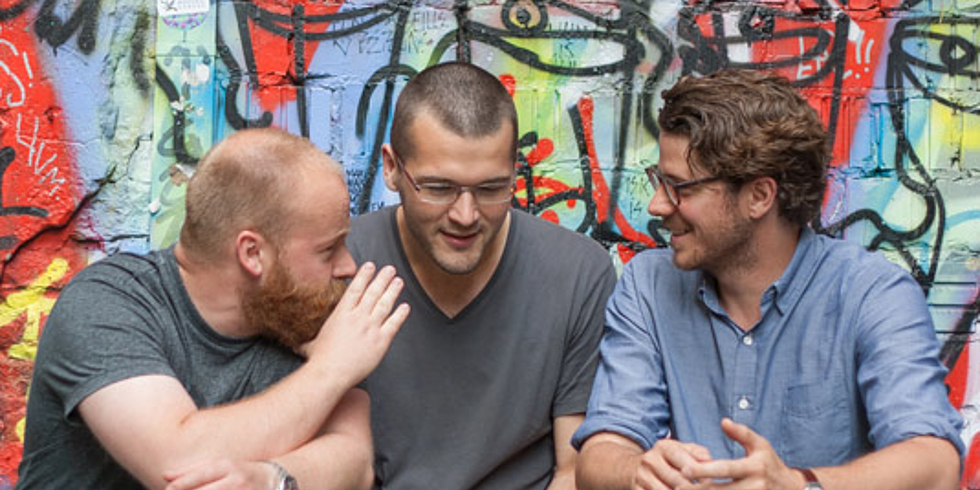Philipp Skribanowitz of Mimi
In early 2014, Nick Clark, Philipp Skribanowitz and Pascal Werner founded Mimi Hearing Technologies GmbH. Their goal: developing hearing technologies without having to resort to a hearing aid. Projekt Zukunft talked to Philipp Skribanowitz about the meaning of the term “mimification” and how this can ensure a better sound.
Mr Skribanowitz, many people with hearing problems are not aware of their problem at all or avoid taking action. Why is this?
Hearing loss is a gradual process. At first it might not be significant and people get used to their reduced hearing ability until, at some point, they suddenly realise what is happening to them and they start taking action. This is aggravated by the fact that hearing loss continues to be stigmatised in the public eye. as opposed to wearing prescription glasses, for example, which is much more accepted in society.
The “Mimi hearing test” app not only enables users to check their hearing. With “Mimi Music” they can use their smartphone to listen to their favourite songs with the sound customised to suit their individual hearing abilities. You have filed a patent application for your product. How exactly does the “mimification” process work?
Our algorithm, which we refer to as “mimification”, is based on the functioning of the human auditory system. For example, details in the music are emphasised through a psycho-acoustic effect and, based on the hearing test, nuances in the range of frequencies are made perceptible for the listener.
However, the app can't yet replace a hearing aid. When can we expect this to happen?
It is our goal to improve hearing in all areas. For example in smartphones, cars, hearables, etc. We believe that the boundaries between lifestyle and health products will continue to become blurred. Today, for example, headphones/hearables can cover many areas where you needed a hearing aid in the past. However, we want people to use our technology well before they would consider using a hearing aid. Especially if you use Mimi Music to improve the sound it will be easier for society to overcome the stigma of hearing-impaired persons as they would be able to use the same product for early-stage hearing loss. Following the slogan: “a good pair of running shoes are still a long way from a walking stick.”
Can you tell us if you are working on any other apps that we can look forward to using in the near future?
Unfortunately, I can’t tell you which products we will be releasing. All I can say is this: we are working on a technology that in this form has never been made available to a broader audience. In our area, we are working on both preventive measures and those accompanied by therapy. Also, we won't stop at music processing. In addition to that, we will of course be adding some new features to our current products.
Early 2014, Mimi received funding from renowned business angel and serial investor Christophe Maire. What’s your take on access to risk capital for Berlin-based startups and are you currently planning a financing round?
I believe that thanks to Christophe Mimi has access to a much better network than other startups. Generally, access to risk capital in Berlin has improved, however, it is still significantly more difficult for German and European companies to receive appropriate funding than it is for US companies. At the moment, Mimi is not receiving any money from a financing round, however, we are always open to talks. The better you know and understand each other the better a future collaboration will be.
Along with access to capital, partnerships with established companies and organisations are also relevant for young companies in order to grow quickly and successfully. You have the Charité hospital on board as a partner. Can you tell us more about this cooperation?
Of course, for us it is extremely helpful to have a competent partner at our side. The Charité has in-depth specialist expertise which would otherwise be difficult to get access to. At the same time, the diverging planning periods are always a challenge. Especially for young startups who are always working towards the next three-month milestone or capital injection it is always interesting and entails considerable effort to cooperate with larger organisations which are already established and tend to think in years. Sometimes this can be a clash of different paces. Nevertheless, we are very grateful to the Charité for their great cooperation.
In the EU, your app is a CE-certified medical product. For startups in the health sector such certification processes entail a lot of effort considering the scarcity of own resources. How did you manage to obtain the certification?
It was a big decision for us to go down that route because as a startup you don't know what you’re letting yourself in for. However, at the end of the day it was important for us to show that we have a reliable product that is based on science. This is why we decided that a CE certification makes sense for us. While we were working on this we realised that we had already covered many of the conditions that have to be met in order to obtain a certification, for example a high degree of data privacy and conscious quality management processes. The problem is that prior to applying for certification you don't know what actually awaits you. However, we had good partners, such as mpP--Group and Bundesverband Internetmedizin (federal association for online medicine) who supported us throughout the process. The certification was definitely worth it for us as it turned out to be less work than we had initially expected and it has already opened a lot of doors for us.
Could you finally please complete the following sentence: Berlin is...
... the perfect place for a startup like ours.
Contact
Tanja Mühlhans
Leitung Kreativ- und Medienwirtschaft, Digitalwirtschaft, Projekt Zukunft


